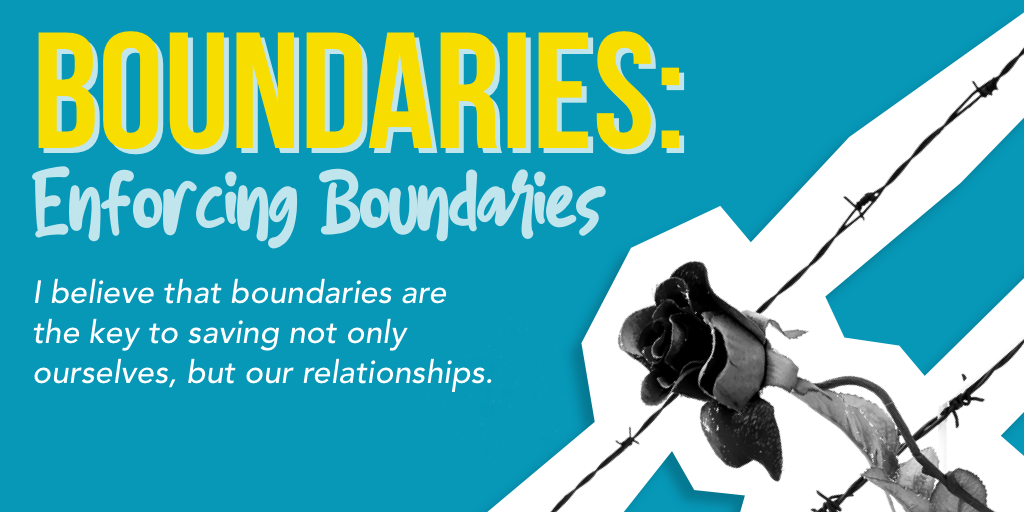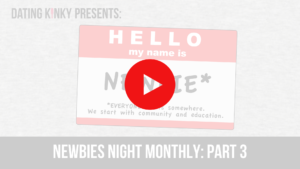I’ve written a lot about boundaries (and I’ll be writing more, since I’m working on a book about them) because I believe that boundaries are the key to saving not only ourselves, but our relationships.
Sound a bit strong?
I don’t think so. If anything, I’m understating how I feel about boundaries as a personal road map to most of life—at least interpersonal life.
In my posts about the six types of boundaries, I explain what each type of boundary is, what it looks like, and give examples of crossing boundaries. I also share questions to ask yourself (and any partners) to dig deeper into understanding how boundaries might affect your relationships.
But the question I get asked most often is, “How do I enforce a boundary?”
Good question! Thank you for asking.
I have a method that works for me that I developed through trial and error.
Here it is in a nutshell:
- State your boundary.
- Wait and observe.
- If you need to state it again, do so. Possibly with a deeper explanation.
- Wait and observe (again).
- If your boundary is still not honored, you have a choice to make.
Simple.
But not easy for most of us. Because for this to be it’s most effective, you’ll need a combination of self-awareness, communication skills, and a willingness to hold yourself and others to consequences.
And that’s a lot.
Let’s go through these in detail.
1. State your boundary.
When going into a discussion about boundaries, especially when you are new to enforcing boundaries, it’s ideal if you can be as calm as possible.
People are generally more open to calm communication than to yelling and screaming.
If you can, talk with a friend or family member to vent or journal to take the edge off before starting the conversation.
It can help to plan what to say and how you want to say it.
A. Use simple and direct language, and as much as possible focus on yourself and your feelings rather than others. “I statements.”
“When you did this, I felt that. Could you please not do that around me? I’d really appreciate it.”
“Can I get back to you on that? My time is really tight right now, and I would like to think things through before making a decision.”
“I feel like conversation degrades when we yell. If you continue, I’ll leave the room, and we can pick this up another time when we are both calmer.”
B. Boundaries are a right, and do not need to be defended, debated, or over-explained.
Be direct. Be honest. Be compassionate, if possible. Do not use boundary setting as an excuse to punish or to use brutal or attacking language.
C. Be ready to follow through on any statements.
I generally don’t suggest using ultimatums, except in the mildest sense. They often make people feel attacked, and shut off additional engagement.
However, if you do, like with the example about about leaving the room if they keep yelling, you have to be willing to follow through. If you do not follow through, you sabotage yourself and your boundaries, by broadcasting that you don’t value them enough to do what you say.
2. Wait and observe.
As I noted above, “boundaries are a right, and do not need to be defended, debated, or over-explained.” If someone wants to ask questions about your boundary to understand it better, well, it’s up to you to decide whether to answer them.
However, I would suggest not letting someone question whether your boundary is valid, or getting in a discussion about the boundary’s existence.
State your boundary, make it clear that it matters to you, then watch to see what happens over time.
For someone who cares about you and your boundaries, you will likely notice an immediate effort to change, because they don’t want to hurt to harm you.
(Note that I say “effort to change,” not “change.” Some things can take time and reminders, and that’s important to honor.)
### 3. If you need to state it again, do so. Possibly with a deeper explanation.
If you don’t see change or effort to change, it’s possible that you caught them at a bad time last time, that your communication was less effective than it could have been, or that they need a bit…more…to get it through their thick skulls.
In a case like this, definitely take time to plan out the conversation if you can, since this is the big one.
Ask for a good time to discuss it, and make it clear that their actions are impacting you negatively. Give them every opportunity to understand how you feel.
4. Wait and observe (again).
This time, it can be helpful to plan out a few parameters:
A. How long are you willing to wait for change or at least honest effort?
B. How will you measure that change or honest effort?
C. Are you willing to offer help/reminders during this time? (Be careful of nagging or constant correction—even if it works, you’ll likely foster some resentment for it.)
5. If your boundary is still not honored, you have a choice to make.
And this is where simple is really, really hard, sometimes. Because choosing to honor yourself and your boundaries can often mean letting someone go. Or reducing how you choose to interact with them.
Because you really don’t want to continue being harmed by them, do you?
You will make mistakes.
I promise. We all do.
You’ll probably royally fuck up in many different ways. It’s part of being human. Here are a few common mistakes:
- Mistaking a rule or manipulation for a personal boundary.
- Using accusatory language.
- Trying to “force” a behavior, rather than allowing the other person to make the change on their own.
- Threatening or using ultimatums.
- Making the stakes too high.
- Allowing an exception and lowering your standards.
I’m sure there are dozens more.
But despite mistakes, if you practice enforcing your boundaries, you’ll get better.
You will lose people from your life.
If you’ve not been enforcing boundaries, and you start, you will likely lose people from your life.
I was going to say you’d lose friends, but I feel like friends will encourage you to set and enforce boundaries, because they know that’s taking care of you. So, it’s more like you will learn who your friends are.
When a woman asked me to help her grow, and I learned she had almost nonexistent boundaries in her life, I told her, “It’s gonna hurt. People that you love today, you probably won’t even like once you start living your authentic life. And that’s gonna be real pain. But if you grow through it, you’ll also discover a whole new set of people—as if they were just waiting for you to become the YOU they could love.”
And it’s true.
It will be hard. And it will suck. But it will be worth it.
What are your thoughts?
How do you enforce your boundaries? Do you have a process that has helped you? How many chances do you give? What limits do you set on yourself, to help you maintain your personal well-being?








